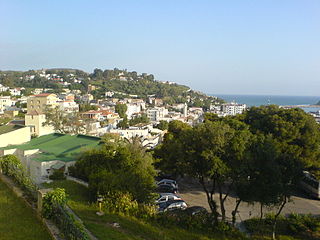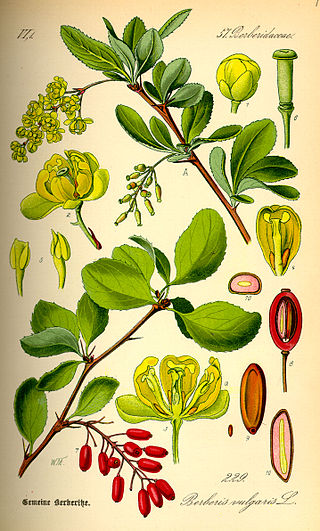
Mahonia aquifolium, the Oregon grape or holly-leaved barberry, is a species of flowering plant in the family Berberidaceae, native to western North America. It is an evergreen shrub growing 1–3 meters tall and 1.5 m (5 ft) wide, with pinnate leaves consisting of spiny leaflets, and dense clusters of yellow flowers in early spring, followed by dark bluish-black berries.

Mahonia is a genus of approximately 70 species of evergreen shrubs and, rarely, small trees in the family Berberidaceae, native to eastern Asia, the Himalaya, North and Central America. They are closely related to the genus Berberis and botanists disagree on whether to recognize a separate Mahonia. Many botanists prefer to classify Mahonia as a part of Berberis because several species in both genera are able to hybridize, and because there are no consistent morphological differences between the two groups other than the leaf pinnation. However, recent DNA-based phylogenetic studies retain the two separate genera, by clarifying that unifoliolate-leaved Berberis s.s. is derived from within a paraphyletic group of shrubs bearing imparipinnate evergreen leaves, which are then divided into three genera: Mahonia, Alloberberis, and Moranothamnus ; a broadly-circumscribed Berberis would also be monophyletic.

Berberis, commonly known as barberry, is a large genus of deciduous and evergreen shrubs from 1–5 m (3.3–16.4 ft) tall, found throughout temperate and subtropical regions of the world. Species diversity is greatest in South America and Asia; Europe, Africa and North America have native species as well. The best-known Berberis species is the European barberry, Berberis vulgaris, which is common in Europe, North Africa, the Middle East, and central Asia, and has been widely introduced in North America. Many of the species have spines on the shoots and all along the margins of the leaves.
This is a list of engines produced by Mitsubishi Motors since 1964, and its predecessors prior to this.

Tabarka is a coastal town located in north-western Tunisia, close to the border with Algeria. Tabarka was occupied at various times by Berbers, Punics, Greeks, Romans, Arabs, Genoese and Ottomans. The town is dominated by an offshore rock on which there remains a Genoese castle. Nationalist leader Habib Bourguiba, later president of post-independence Tunisia, was exiled on Tabarka by the French colonial authorities in 1952. Tourist attractions include coral fishing, the Coralis Festival of underwater photography, and its annual jazz festival.

The Berberidaceae are a family of 18 genera of flowering plants commonly called the barberry family. This family is in the order Ranunculales. The family contains about 700 known species, of which the majority are in Berberis. The species include trees, shrubs and perennial herbaceous plants.

Berberis darwinii, Darwin’s barberry, is a species of flowering plant in the family Berberidaceae, native to southern Chile and Argentina and naturalized elsewhere. Regional vernacular names include michay, calafate, and quelung. Growing to 3–4 m (9.8–13.1 ft) tall, it is an evergreen thorny shrub.

Berberis vulgaris, also known as common barberry, European barberry or simply barberry, is a shrub in the genus Berberis native to the Old World. It produces edible but sharply acidic berries, which people in many countries eat as a tart and refreshing fruit.

Berberis thunbergii, the Japanese barberry, Thunberg's barberry, or red barberry, is a species of flowering plant in the barberry family Berberidaceae, native to Japan and eastern Asia, though widely naturalized in China and North America, where it has become a problematic invasive in many places, leading to declines in species diversity, increased tick habitat, and soil changes. Growing to 1 m tall by 2.5 m broad, it is a small deciduous shrub with green leaves turning red in the autumn, brilliant red fruits in autumn and pale yellow flowers in spring.
Tomohiro Saitō, known professionally as Hiro Mizushima, is a Japanese actor, creative director, and writer. He appeared in a number of Japanese TV dramas, including Mei-chan no Shitsuji, Hanazakari no Kimitachi e and Zettai Kareshi. Additionally, he was well known as the protagonist Souji Tendo in the tokusatsu series Kamen Rider Kabuto. Mizushima serves as the co-producer, co-screenwriter and leading actor for the latest film Black Butler which is the live-action film adaptation of the popular manga. His birth name "Tomohiro Saito" is being credited as co-producer in the film.

Berberine is a quaternary ammonium salt from the protoberberine group of benzylisoquinoline alkaloids

Agitator is a 2001 Japanese film directed by Takashi Miike.

The Mitsubishi Mizushima is the first of a series of three-wheeled cargo carriers made in Japan by Mitsubishi between 1947 and 1962. A number of prototypes were built in 1946, leading to series production beginning in May 1947. Along with the Silver Pigeon scooter it represented the company's first contributions to the Japanese post-war personal transport boom.

Shinji Mizushima was a Japanese manga artist. He is best known for several baseball manga, such as Yakyū-kyō no Uta, Dokaben, and Abu-san. He is a two-time recipient of the Shogakukan Manga Award. His works have been collected into more than 540 tankōbon volumes, making him one of the most prolific manga artists of all time.

The Kofa Mountains of Yuma and La Paz counties in Arizona is the central mountain range of the Kofa National Wildlife Refuge. The range lies about 60 miles northeast of Yuma in the southwestern part of the state. Kofa Wilderness takes up 547,719 acres of the refuge, making it the second largest wilderness area in Arizona. The equally extensive Castle Dome Mountains comprise the southern refuge border; the western end of the Tank Mountains are in the southeast of the wildlife refuge, and the New Water Wilderness in the New Water Mountains ends the extension of the Kofa National Wildlife Refuge to the north. Scenic "King Valley" is south of the Kofa Mountains between the Castle Dome Mountains.
The 2009 Japan Football League was the eleventh season of the Japan Football League, the third tier of the Japanese football league system.

Ratman is a Japanese shōnen manga written and illustrated by Sekihiko Inui. The series follows the story of Shuto Katsuragi, a wannabe hero, who tries to save his friend, but ends up becoming the "villain" Ratman.
Berberis standleyi is a shrub in the Berberidaceae described as a species in 1952. It was published with the name Mahonia glauca, a very different plant from Berberis glauca. Thus if one desires to consider Berberis and Mahonia as one genus instead of two, it is necessary to use a different name, i.e. Berberis standleyi.

Kurashiki is a city located in Okayama Prefecture, Japan. As of 31 March 2023, the city had an estimated population of 478,651 and a population density of 1300 persons per km². The total area of the city is 355.63 square kilometres (137.31 sq mi).












